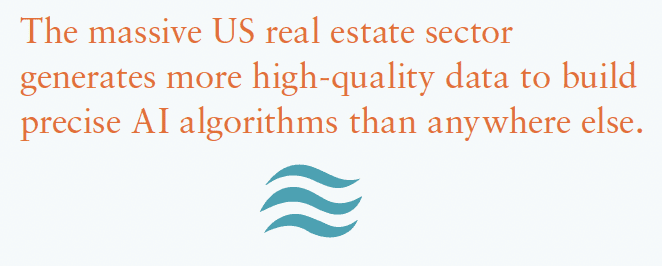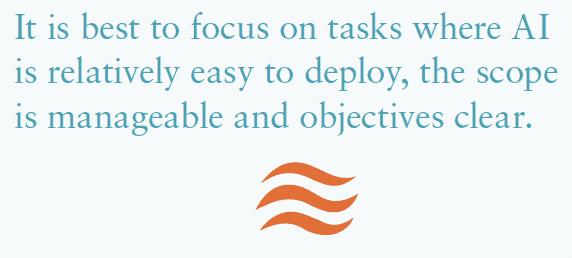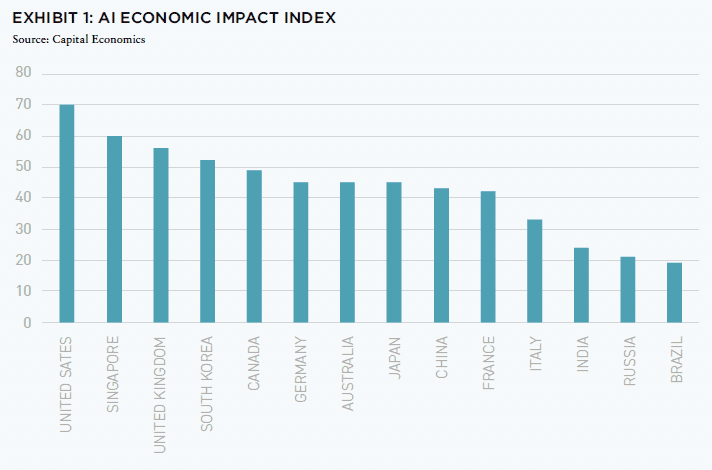By blending emerging capabilities such data fluency and AI literacy with distinctly human strengths, creativity, and emotional adeptness, real estate leaders will be positioned to have an outsized impact for the commercial real estate industry.
The winds of technological change are stirring, and artificial intelligence (AI) is at the heart of the gathering storm. And as AI transforms industries from transport to healthcare, the real estate sector stands at the forefront of change.
The pace of change is startling, and the potential impacts of AI are already proving their profundity. After examining more than 900 US jobs, economists at Goldman Sachs concluded that approximately two-thirds are susceptible to partial or complete automation using artificial intelligence.1
Recently, several technology companies that have scaled back their workforce have referenced AI as a factor. In October 2023, Stack Overflow, the leading question-and-answer platform for computer programmers, reduced its headcount by approximately 28%. Academic research shows that customers were using large language models as an effective substitute2 and the company was forced to adapt by replacing people with generative AI-driven coding assistants.
Furthermore, the impact of AI is penetrating jobs thought less vulnerable to automation, including creative professions. Though long considered purely logical, AI systems exhibit creativity, conceiving innovative ideas for practical applications. In studies, these AI-generated concepts surpassed what many people produced independently.3
However, there is a lot we can learn from the past about disruptive technologies and their impact that can inform our expectations about the impact of AI.
TECHNOLOGICAL CHANGE THROUGH A HISTORIC LENS
History teaches that disruptive innovations inevitably spark transition pains. But with hindsight, we also see how economies adapted, and new opportunities emerged.
For example, the introduction of the computer spreadsheet was transformational to office work. Many feared this technology would destroy bookkeeping jobs. However, rather than making accountants obsolete, spreadsheets complemented their skills and reduced costs, allowing small businesses to hire accounting services and creating new industry jobs.

Spreadsheets increased demand for accountants, transforming roles rather than reducing them.
More generally, the history of innovation shows how technology redistributes work more than eliminates it. New industries, jobs, and tasks arise as old ones decline.
Projecting this forward, AI will likely transform real estate work without terminating it. In real estate, content creators will be able to embrace customization, creating bespoke reports for each client highlighting the trends and data points most relevant to them. Appraisers will increasingly work with automated valuation models to add new types of data and processing methods improving the accuracy and efficiency of their work. Client relationship managers will be able to build and leverage a much deeper understanding of their customers not only through data analysis but also through a deeper understanding of the context their client’s face. Manager selectors will be able to utilise qualitative data to, for example, assess the cultural traits of organizations and even score and compare nebulous concepts. Critically, none of these use cases replaces humans and it’s easier to think of AI as augmenting their work.
As these examples show, AI promises to elevate productivity and value for professionals who skillfully adapt. Indeed, there is emerging academic evidence that generative AI tools can be a huge productivity enhancer for knowledge workers.
THE RISE OF HUMAN-AI COLLABORATION
Emerging evidence shows AI empowering knowledge workers. Intelligent assistants such as ChatGPT demonstrate how AI can turbocharge human productivity and creativity.
A recent study by a team of social scientists working with Boston Consulting Group showed that consultants who used Chat-GPT performed significantly better than those who did not. The study found that consultants using AI completed 12.2% more tasks on average, finished tasks 25.1% more quickly, and produced outputs rated 40% higher quality.4
Rather than replacing consultants, ChatGPT enhanced their capabilities and value, turbocharging professionals’ skills. Consider, for example, how AI can assist an investment risk function within a real estate investment manager. Increasingly, generative AI tools are being used to aid risk identification and the assessment of the scale and probability of each downside scenario. Relatedly, firms are building tools that automatically monitor news flow to highlight trends that might affect the credit worthiness of tenants. More generally, AI can be used to bring efficiencies to the reporting of investment risks to allow more time to be spent on risk analysis and assessment.
EMERGING REAL ESTATE APPLICATIONS
AI promises a revolution in real estate investing. Historical resource constraints have shaped existing working practices. In a world of cheap and abundant intelligence, those resource constraints have been lifted, and the optimal way of doing things has changed.
Early adopters are achieving significant efficiency gains by partially automating many aspects of the real estate investment process, from market analysis to financial modelling, report writing, and thought leadership.
These tasks often require a lot of manual input, data manipulation, and spreadsheet work. They can take up much valuable time, which could be better spent on more strategic, higher-value activities. No longer bogged down running models or cranking reports, real estate can devote time to strategy, deals, and clients.

Many efficiency gains and opportunities to redeploy resources are being discovered bottom-up. Once empowered to utilize these tools, workers are quickly finding out for themselves how to do their jobs quicker and faster.
After consulting widely across the investment management industry, we are well positioned to highlight some of the most exciting use cases being discovered and suggest the scope for further transformation. The first areas to be affected by AI are determined by where implementation is easy and/or gains from using AI are potentially high.
• Advanced analytics in asset selection: AI tools can help evaluate more opportunities faster and better. These tools reduce the risk of missing an opportunity and enable companies to proactively initiate discussions about off-market transactions, gaining an edge over competitors. AI tools can also speed up the decision-making process, allowing access to transactions requiring quick action. It is relatively easy for processes in this area to be augmented using AI and efficiency gains will make a big difference to their effectiveness.
AI-powered underwriting can map the risk landscape and understand tail risks before acquisition, avoiding costly mistakes and maximizing returns. Increasingly, investment analysis will be much more like risk analysis. The pace of evolution in the work of many transaction-focused analysts will be unprecedented.
• Superior portfolio construction: Real estate fund managers are better placed than ever to optimize portfolio composition and performance based on their objectives and constraints. Historically, portfolio construction has been focused on geography and sector. This has not been because these two variables are the most important drivers of performance; rather, it is the result of data availability. Real estate fund managers are now entering a new era when diversification can be assessed along many more dimensions.
Machine learning tools now exist to undertake detailed analyses of dozens of factors to understand what really drives property and portfolio performance and how these variables interact with each other. These tools enable portfolio managers to diversify more effectively, reducing exposure to market shocks and volatility. Going beyond geography and sector, managers will be able to consider specific climate risks, energy efficiency, interest rate, growth and inflation sensitivity, different forms of leasing risk, development risk, buildings of different ages and quality, specific tenants and broader economic sectors, operational expenditure and regulatory risk, for example. Implementing AI in this area is not the easiest as processes are complex and heterogeneous but it adda a huge amount of value to the outcomes.
AI-powered models will enable a probabilistic assessment of the impact of many variables to be built into portfolio construction tools. Portfolio monitoring can now take place on an ongoing basis with minimal resources. In addition, fund managers can deploy AI-powered hold/sell analysis that constantly looks for an attractive selling point. All this points to portfolio considerations weighing more heavily on investment decisions, rectifying an excessive focus on individual deals and properties.
• Building robust income streams: asset managers can use AI tools to enhance their relationship and interaction with tenants, increasing occupancy and rental income. Market leaders use predictive analytics to target and retain tenants who will pay more and stay longer. Furthermore, asset managers can use AI tools to predict lease renewals, allowing asset managers to devote appropriate resources to each lease event. It is even possible to add qualitative data sources directly into your quantitative analysis and it can come from reports, videos or conversations. AI unlocks multiple opportunities for more proactive tenant acquisition and retention. As smart locks and smart buildings generate more data points, AI-driven analysis possibilities will continue to grow. Implementation will require training of and imagination from individuals as each faces unique challenges, but AI will enable big changes and efficiency gains.
• Better client management: AI tools can help portfolio managers improve their communication and service to clients, strengthening trust and reducing the risk of redemptions in periods of market weakness. AI tools can better understand clients’ needs, preferences, and concerns and predict their behavior. More profound client knowledge will allow for proactive management. As AI seems to understand human behavior and incentives better than humans, it can tell you much about your clients and help you keep them satisfied. Implementation of AI for client management is easy but involves risk so needs to be done with caution. However, the gains it can create in understanding customers better are likely well worth the risk!
With such compelling use cases, AI clearly allows real estate professionals to thrive, not just survive. Their work is elevated in both meaning and impact.
Real estate executives will be quick to recognize the competitive advantages that lie in adapting to an AI powered workplace. While a lack of technical expertise, an uncertain return on investment and organizational resistance present challenges, executives need to rethink processes now that intelligence is abundant and pre-existing resource constraints are reduced. Initial steps should be to augment data strategies and foster an understanding of AI across teams.
A critical component is cultural. The real estate organizations that have leveraged the most from generative AI tools to data are those that have empowered and encouraged their teams to rethink their processes. By working out how to do their job better and faster, team members are driving bottom-up improvements that compound to meaningful transformation. Real estate executives can accelerate adoption and encourage experimentation by promoting small but scalable projects. It is best to focus on tasks where AI is relatively easy to deploy, the scope is manageable and objectives clear. For example, rapid customization of reports for clients, content creation or predictive analytics may be areas where quick wins are achievable.
IN THIS ISSUE

NOTE FROM THE EDITOR: WELCOME TO #14
Benjamin van Loon | AFIRE
INSURING FOR ELSEWHERE: CLIMATE-RESPONSIVE REAL ESTATE INVESTMENT
Benjamin van Loon | AFIRE
INSURING FOR ELSEWHERE: STRIPPING THE CASHFLOW FROM THE DEAL
Paul Fiorilla | Yardi
MARKET OUTLOOK: MODEST GROWTH AND RETREATING INFLATION IN 2024
Martha Peyton, CRE, PhD | LGIM America
UNDERPERFORMANCE PARADOX: NEW RESEARCH QUESTIONS THE VALUE OF PRIVATE REAL ESTATE FUNDS
William Maher, Taylor Mammen, Ben Maslan | RCLCO Fund Advisors
NAVIGATING THE CURVE: RESILIENCE, ADAPTATION, AND PREPARING FOR 2024
Jack Robinson, PhD | Bridge Investment Group
LIQUIDITY FREEZE: POTENTIAL SOLUTIONS FOR COMMERCIAL REAL ESTATE
Christopher Muoio | Madison International Realty
SUPPLY WAVE: REASON FOR OPTIMISM IN THE MULTIFAMILY SECTOR
Sabrina Unger, Britteni Lupe | American Realty Advisors
MANAGE WHAT YOU MEASURE: UNDERSTANDING EXPENSE INFLATION IN APARTMENTS
Gleb Nechayev | Berkshire Residential + Webster Hughes, PhD | ThirtyCapital
PARSING OFFICE DISTRESS: PLANNING FOR THE NEXT GENERATION OF OFFICE SPACE
Dags Chen, Lincoln Janes, CFA | Barings Real Estat
MODEL STATES: USING ECONOMIC STATE MODELS TO ASSESS THE US OFFICE OUTLOOK
Armel Traore Dit Nignan | Principal Real Estate
OUTWARD SHIFT: WILL THE LOGISTICS SECTOR CONTINUE TO OUTPERFORM?
Kerrie Shaw | AXA IM Alts
HARNESSING THE WIND: TECHNOLOGICAL CHANGE AND THE PROMISE AND PERIL OF AI FOR REAL ESTATE
Nikodem Szumilo | University College London + Chris Urwin | Real Global Advantage
MIND YOUR DATA: REAL ESTATE INVESTING, FROM THE POINT OF VIEW OF A DATA NERD
Ron Bekkerman, PhD
OPERATING EXPENSES RISING THE OTHER MAJOR COMPONENT OF NOI GETS MORE FOCUS
Stewart Rubin, Dakota Firenze | New York Life Real Estate Investors
IN MEMORIAM: JANICE STANTON
+ LATEST ISSUE
+ ALL ARTICLES
+ PAST ISSUES
+ LEADERSHIP
+ POLICIES
+ GUIDELINES
+ MEDIA KIT (PDF)
+ CONTACT

WHY US REAL ESTATE IS PRIMED FOR AI
As AI unlocks new possibilities for real estate professionals, there are good reasons to expect the US market to gain the most.
The US has a track record of maximizing new technological innovations such as AI to fuel economic outperformance. Look to the past benefits of information and communication technology (ICT) for lessons. Between 1995 and 2005, ICT innovations provided a 1.5 percent per year boost to US annual productivity growth—the highest marginal gain globally.5 Why did America reap disproportionate rewards?
Key advantages such market size, nimble regulations, and abundant tech investment primed the US economy to adopt ICT and unlock value rapidly. Today, these same structural edges position the US to extract more economic impact from AI than most other countries.

The concentration of venture capital and tech talent are critical advantages. Furthermore, supportive policy and ease of business incentivize more private capital to flow into progressive US tech firms.
Capital Economics has developed an AI Economic Impact Index that allows for an assessment of which economies are best placed to benefit from AI over the next couple of decades. They develop a composite score based on metrics of three critical factors: innovation, diffusion, and adaption. As the Exhibit 1 shows, the US achieves the highest score.6
The size of the US real estate market matters, too. It enables scale and data depth, which are critical to advancing new technologies. The massive US real estate sector generates more high-quality data to build precise AI algorithms than anywhere else.
Indeed, some of the most exciting innovations are occurring in the most data-rich markets, such as US single-family rentals and apartment buildings. Uniquely, there is a competitive marketplace of AI-enhanced automated valuation models in the residential market, for example. Utilizing similar technologies, we can foresee a future where the work of appraisers is dominated by the use of AI.
With the proper safeguards and skill building, American real estate is poised to surf the crest of the mounting AI wave.
A CHANCE TO CHART A BRIGHTER COURSE
Some turbulence lies ahead as AI continues its relentless advance into real estate. There will likely be pressure on traditional roles, business models, and working methods.
However, the history of innovation teaches us that technology ultimately creates more opportunities than it destroys. While some jobs may become obsolete, many more new and valuable roles will emerge at the human-machine frontier.
Real estate professionals who skilfully surf this wave of change have an exciting future. Real estate professionals are going to have to rethink and relearn their jobs. But by blending emerging capabilities like data fluency and AI literacy with distinctly human strengths, creativity, and emotional adeptness, they will become more impactful than ever.
The winds of change are here—and with them, a chance to chart a brighter course.
—
ABOUT THE AUTHORS
Nikodem Szumilo is an Associate Professor at University College London and the director at the Bartlett Real Estate Institute. He is also a director of VARi Knowledge Partners, an academic visitor to the Bank of England and a Research Affiliate of the UCL Centre for Finance. Chris Urwin is an investment strategist, market analyst and researcher. He is a strategic advisor to Built AI and VARi Knowledge Partners. He is the founder of Real Global Advantage, a platform to promote better investment decisions in global real estate.
—
NOTES
1. Goldman Sachs. “Generative AI Could Raise Global GDP by 7 Percent.” https://www.goldmansachs.com/intelligence/pages/generative-ai-could-raise-global-gdp-by-7-percent.html. Accessed January 30, 2024.
2. del Rio-Chanona, Maria, Nadzeya Laurentsyeva, and Johannes Wachs. “Are large language models a threat to digital public goods? evidence from activity on stack overflow.” arXiv preprint arXiv:2307.07367 (2023).
3. Haase, Jennifer, and Paul HP Hanel. “Artificial muses: Generative artificial intelligence chatbots have risen to human-level creativity.” arXiv preprint arXiv:2303.12003 (2023).
4. Dell’Acqua, Fabrizio and McFowland, Edward and Mollick, Ethan R. and Lifshitz-Assaf, Hila and Kellogg, Katherine and Rajendran, Saran and Krayer, Lisa and Candelon, François and Lakhani, Karim R., Navigating the Jagged Technological Frontier: Field Experimental Evidence of the Effects of AI on Knowledge Worker Productivity and Quality (September 15, 2023). Harvard Business School Technology & Operations Mgt. Unit Working Paper No. 24-013, Available at SSRN: https://ssrn.com/abstract=4573321
5. “AI, Economies and Markets – How artificial intelligence will transform the global economy,” Capital Economics. https://www.capitaleconomics.com/ai-economies-and-markets-how-artificial-intelligence-will-transform-global-economy. Accessed January 30, 2024.
6. Ibid.
—

